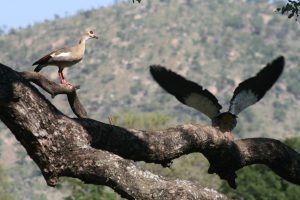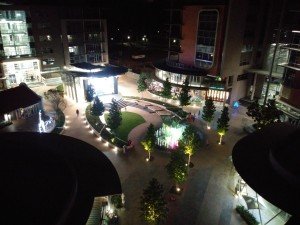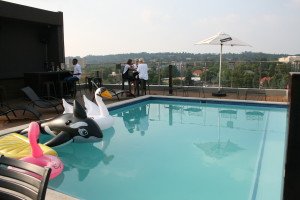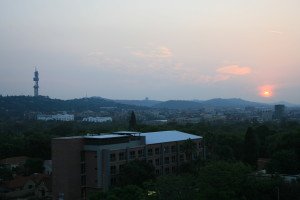River Cottage, Malelane 0
The Alfred Dunhill Championship is a prestige golf tournament co-hosted by Southern Africa’s Sunshine Tour and the European Tour, held every summer at the famous Leopard Creek estate outside Malelane. The best part of covering this event is that I get to stay at River Cottage, one of the finest bed and breakfast guesthouses I have had the pleasure of frequenting.
The “River” it is named after is the famous Crocodile River on the southern border of the Kruger National Park and River Cottage is right on the riverside, with an elevated view on to South Africa’s most famous game reserve.
Apart from the spacious units, which are fully equipped for those wanting to self-cater, River Cottage also has beautiful gardens which attract a wealth of birdlife that is slightly different to that found along the river. It’s not often you find a place that combines a sense of wilderness in the pristine bushveld with such comfort.
I have a wonderful start to every day at River Cottage, getting up early to do a circuit of the gardens and the riverfront before sitting down for the sumptuous breakfast and then heading off to work at the golf.
The delicious prospect of what denizens of Kruger Park are down at the river is exciting enough, but first one wanders through the trees of the garden and past some grassy areas that the seedeaters love, collecting a host of Lowveld species. The owners of River Cottage are clearly lovers of the botanical as well, with name tags on the flora and they have planted typical bushveld trees, including even a Baobab and a Mopane, well south of their natural range.
They are not the only inhabitants of further north to be found at River Cottage. While walking along the bank overlooking the river, I became aware of a distinctive purring call coming from high in the trees on the garden side.
It’s a call that always gives me a cheesy grin because it belongs to the African Mourning Dove, one of my favourite Columbids. It is a more typical bird of the restcamps way further north in Kruger Park, such as Satara, Letaba, Mopani and Shingwedzi, with the southern edge of its range usually being north of the bottom camps like Skukuza and Lower Sabie.
African Mourning Dove do love riverine woodland and they are also very fond of Ana Trees, so perhaps it was not too surprising to see one all the way down at the Crocodile River, but it is certainly the furthest south I have ever come across this species.
The River Cottage gardens also attract Brownheaded Parrots to the taller trees and a fruiting fig tree close to the main house hid a few in the canopy, as always they were tough to see but their screeching calls gave them away.
The lapa and sun-deck next to the swimming pool are ideal spots to keep a close watch on the Crocodile River and Great White and Little Egret, Blacksmith Plover, African Jacana, Blackwinged Stilt, Grey, Squacco and Greenbacked Heron, Egyptian and Spurwinged Goose, African Pied Wagtail, Reed and Whitebreasted Cormorant, Spottedbacked and Thickbilled Weaver, Lesser Striped Swallow, Woodland, Pied and Malachite Kingfisher, African Spoonbill, Sacred Ibis, Water Dikkop, African Darter, African Fish Eagle and Natal Francolin are all usually present and easily spotted along the banks.

Egyptian Goose taking off from River Cottage, across the Crocodile River. Note the steep terrain on the Kruger National Park side.
Even less common birds like the Horus Swift, Lesser Masked Weaver and Redfaced Cisticola, which pops up in the reedbeds and other riverside vegetation with its bright silky-white chest and loud, piercing call, are often seen.
Nile Crocodiles are almost always present along this stretch of river that bears their name, while Waterbuck, African Elephant and Impala are usually hanging around.
A troop of Banded Mongoose sometimes ventures down from the surrounding woodland and there is even one family living on the property, while it is always interesting watching the Nile Monitors go about their predatory business either in or around the water.
As the riverine trees thin out heading away from the water, the grass gets longer and rank and a different suite of birds can be seen.
Dusky Flycatcher, Orangebreasted Bush Shrike, Paradise Flycatcher, Arrowmarked Babbler, Whitebellied and Collared Sunbird, Spectacled Weaver and Plumcoloured Starling still prefer some trees around, many of them hosting a resident Southern Tree Agama, but the more scrubby areas attract birds like Whitewinged Widow, Blue Waxbill, Bronze Mannikin, Redbilled Quelea, Yellowfronted Canary and Burchell’s Coucal.
There is probably no finer spot to enjoy the creatures of the Kruger National Park from outside the reserve.
Sightings List
Kurrichane Thrush
Speckled Mousebird
Dusky Flycatcher
Great White Egret
Blacksmith Plover
Striped Skink
African Jacana
Blackwinged Stilt
Grey Heron
Egyptian Goose
African Pied Wagtail
Reed Cormorant
Spottedbacked Weaver
Horus Swift
Nile Crocodile
Lesser Striped Swallow
Waterbuck
Thickbilled Weaver
Orangebreasted Bush Shrike
Woodland Kingfisher
Yellowbilled Kite
Redeyed Dove
Whitewinged Widow
Forktailed Drongo
Squacco Heron
Greenbacked Heron
African Palm Swift
Glossy Starling
Brownheaded Parrot
Banded Mongoose
Blackeyed Bulbul
Paradise Flycatcher
African Spoonbill
Sacred Ibis
Malachite Kingfisher
Water Dikkop
Laughing Dove
Whitebreasted Cormorant
Southern Tree Agama
African Elephant
Hadeda Ibis
Arrowmarked Babbler
Blue Waxbill
Whiterumped Swift
African Darter
Pied Kingfisher
Impala
Bronze Mannikin
Grey Lourie
Common Myna
African Fish Eagle
Little Egret
Lesser Masked Weaver
Redbilled Quelea
Redfaced Cisticola
Whitebellied Sunbird
Yellowfronted Canary
African Mourning Dove
Spectacled Weaver
Collared Sunbird
Burchell’s Coucal
Helmeted Guineafowl
Plumcoloured Starling
Spurwinged Goose
Nile Monitor
Natal Francolin




